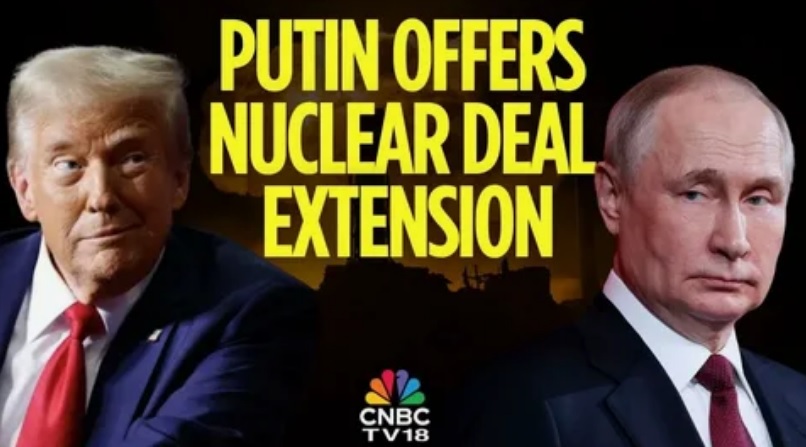
President Vladimir V. Putin of Russia said on Monday that he was prepared to extend existing limits on the number of deployed long-range nuclear weapons for one more year as long as the United States did the same, a move that could give Moscow and Washington time to negotiate a new version of the last remaining arms control treaty between them, ‘The New York Times’ stresses.
Speaking at a meeting of his security council at the Kremlin, Mr. Putin said that Russia wanted to “avoid provoking a further strategic arms race.”
Mr. Trump has said virtually nothing about what the United States plans to do when the New START nuclear treaty expires in February. Under its terms, it can be extended only once, for five years, a step that President Joseph R. Biden Jr. took weeks after assuming office in 2021. A new treaty would presumably take months or years to negotiate, and would require approval of two-thirds of the U.S. Senate — a conclusion hard to imagine in today’s political atmosphere.
After Mr. Trump and Mr. Putin met in Alaska in mid-August, Mr. Trump said they had discussed “nuclear disarmament” but gave no details. An informal extension of New START would not bring about disarmament, but would presumably delay, at least for a year, its opposite: a major nuclear buildup.
At the White House, Mr. Trump’s press secretary, Karoline Leavitt, said Mr. Trump was “aware of this offer extended by President Putin” and said he would soon comment on it. “I think it sounds pretty good,” Ms. Leavitt said.
If the New Strategic Arms Reduction Treaty, the formal name of New START, expires in February, it will mark the end of an era of arms reduction efforts that extends back to the 1960s, after the Cuban missile crisis. New START was the latest of those treaties, signed in 2010 during a brief period of improved relations between Moscow and Washington.
It limited the number of strategic warheads that the United States and Russia could deploy to 1,550 and capped the number of launchers — including intercontinental ballistic missiles, submarines and bombers — that could deliver them.
The existing treaty is already on life support: Russia has abandoned parts of it, and in retaliation the United States has done the same.
The treaty requires each party to accept inspections of nuclear sites each year by the other signatory, and also calls for each side to provide data and notifications about the movements of its nuclear forces.
None of those verification steps are happening.
A new report issued on Monday by the Belfer Center for Science and International Affairs concludes that “many of the tools and mechanisms the United States has traditionally relied upon to combat the spread of nuclear weapons are becoming less effective,” and called for an overhaul of American strategy.
“The possibility of extending commitments under New START by a year is welcome news," Meghan O’Sullivan, a national security official in the Bush administration and one of the primary authors of the Belfer report, said on Monday. “Without such action the world would soon face — for the first time in decades — the absence of any limits on the nuclear arsenals of the United States and Russia.”
But she also noted that “the Trump administration must make clear that President Putin cannot play the ‘good guy’ with Washington while acting as the ‘bad guy’ in Europe. The United States should signal both its willingness to pursue talks to reduce nuclear risks and its determination not to sacrifice a just peace in Ukraine.”
Until Mr. Putin’s comments on Monday, it appeared likely that New START would be abandoned, much as other treaties between Washington and Moscow have been in recent years.
In his remarks on Monday, Mr. Putin ordered close monitoring of American plans to expand the U.S. missile defense system, what Mr. Trump calls the “Golden Dome,” which would include the deployment of interceptors in space. American missile-defense efforts have long rankled the Kremlin, which has viewed them as a threat to its nuclear deterrent.
“We will proceed from the understanding that the practical implementation of such destabilizing actions could undermine our efforts to maintain the status quo in the strategic offensive arms sphere,” Mr. Putin said of the U.S. missile defense plans. “We will respond accordingly.”
read more in our Telegram-channel https://t.me/The_International_Affairs

 10:33 24.09.2025 •
10:33 24.09.2025 •






















